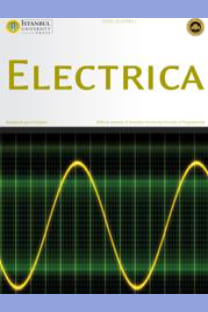A New Formula for Hydrogen Consumption in Hybrid Systems Based on Fuel Cell Current Gradient and Peak Value
___
Y. Hou, C. Shen, D. Hao, Y. Liu, H. Wang, “A dynamic model for hydrogen consumption of fuel cell stacks considering the effects of hydrogen purge operation”, Renew Energy vol. 62, pp. 672-678, 2014. [CrossRef]M. Uzunoglu, M. S. Alam, “Dynamic modeling, design, and simulation of a combined PEM fuel cell and ultracapacitor system for stand-alone residential applications”, IEEE Trans Energy Convers, vol. 21, pp. 767-775, 2006. [CrossRef]
D. Shin, K. Lee, N. Chang, “Fuel economy analysis of fuel cell and supercapacitor hybrid systems”, Int J Hydrogen Energ, vol. 41, pp. 1381-1390, 2016. [CrossRef]
P. Ahmadi, E. Kjeang. “Realistic simulation of fuel economy and life cycle metrics for hydrogen fuel cell vehicles”, Int J Energy Res. Vol. 41, pp. 714-727, 2017. [CrossRef]
Y. Hames, K. Kaya, E. Baltacioglu, A. Turksoy, “Analysis of the control strategies for fuel saving in the hydrogen fuel cell vehicles”, Int J Hydrogen Energ, vol. 43, no. 23, pp. 10810-10821, June 2018. [CrossRef]
G. Sarı, Y. Özçelep, A. Kuntman, “On the optimum powertrain configuration of fuel cell powered vehicle for minimum hydrogen consumption”, 9th International Conference on Electrical and Electronics Engineering (ELECO) Turkey, 2015, pp. 379-382. [CrossRef]
C. Kunusch, F. Castaños, “Extremum seeking algorithms for minimal hydrogen consumption in PEM fuel cells”, American Control Conference (ACC), 2013, pp. 1144-1149. [CrossRef]
B. Morin, D. V. Laethem, C. Turpin, O. Rallières, S. Astier, A. Jaafar, O. Verdu, M. Plantevi, V. Chaudron, “Direct hybridization fuel cell-ultracapacitors”, Fuel Cells Vol 14, pp. 500-5007, 2014. [CrossRef]
H. Fathabadi, “Novel fuel cell/battery/supercapacitor hybrid power source for fuel cell hybrid electric vehicles”, Energy, vol. 143, pp. 467-477, 2018. [CrossRef]
Q Li, W. Chen, Y. Li, S Liu, J. Huang, “Energy management strategy for fuel cell/battery/ultracapacitor hybrid vehicle based on fuzzy logic”, Int J Elec Power, vol. 43, pp. 514-525, 2012. [CrossRef]
M. Uzunoglu, M. S. Alam, “Dynamic modeling, design and simulation of a PEM fuel cell/ultra-capacitor hybrid system for vehicular applications”, Energ Convers Manage, vol. 48, 1544-1553, 2007. [CrossRef]
A. Kabza, “Fuel Cell Formulary, can be found under’’ http://pemfc.de/FCF_A4.pdf, 2016.
J. Larminie, A. Dicks, “Fuel Cell Systems Explained”, John Wiley & Sons, 2003. [CrossRef]
M.R.B. Mustaffa, W.A.N.B.W. Mohamed, R.B. Atan, “Analytical approach to predict hydrogen consumption of a lightweight PEM fuel cell vehicle”, IEEE International Conference on Control System, Computing and Engineering (ICCSCE), 2012, pp. 489-494. [CrossRef]
F. Barbir, “PEM fuel cells: Theory and Practice”, Elsevier Academic Press, California, USA, 2005.
- ISSN: 2619-9831
- Yayın Aralığı: 3
- Başlangıç: 2001
- Yayıncı: İstanbul Üniversitesi-Cerrahpaşa
Assisting 3D Indoor Positioning for Robot Navigation
Ban Isam Rashid ALBAYATİ, SERKAN KURT
Detection of Structural Vibration-Induced Noises with Modal Analysis in Diesel Generators
Uğur ÖLMEZ, Nevra BAYHAN, Hakan DOĞAN, Murat UYSAL
YASİN ÖZÇELEP, Gürcan SARI, Ayten KUNTMAN
FPGA Based Low Cost Automatic Test Equipment for Digital Circuits
Comparative Analysis of Wind Speed Models Using Different Weibull Distributions
EMRAH DOKUR, SALİM CEYHAN, MEHMET KURBAN
Multifunctional Phototherapy Device Design
Enes YALÇIN, M. Cengiz TAPLAMACIOĞLU, ERTUĞRUL ÇAM
Design and Implementation of A Batteryless Wireless Embedded System for IoT Applications
Enhanced SPIHT Algorithm with Pipelined Datapath Architecture Design
İNCİ ZAİM GÖKBAY, Zeynep Beyza ZİLELİ, Pelin SARI, Türker Togay AKSOY, Sıddık YARMAN
